#Haben Girma
Text
Haben Girma: First Deafblind Person To Graduate From Harvard Law School
Disability rights advocate, attorney, and author Haben Girma is the first Deafblind person to graduate from Harvard Law School. Click the link to learn more or listen via podcast.
#Blackmail4u #BlackHistory #HabenGirma #DisabilityRightsAdvocate #ADA
Welcome To Black Mail!
Where we bring you Black History, Special Delivery.
Haben Girma was born in Oakland, California, on July 28, 1988. She was born deafblind. Her mother is originally from Eritrea and came to the United States as a refugee in 1983 to escape the Eritrea War of Independence against Ethiopia. Girma’s father is of Ethiopian descent. Her early education took place in Oakland…

View On WordPress
9 notes
·
View notes
Text
instagram
#african/black experience#afrikan#disability rights#Harvard Law School graduate#Haben Girma#Instagram
5 notes
·
View notes
Text
Quote of the Day - July 23, 2022
Quote of the Day – July 23, 2022
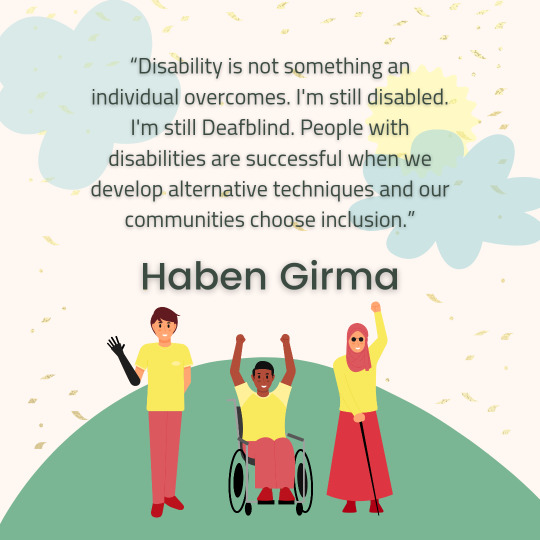
View On WordPress
#Books#Disability Awareness Month#Disability Pride#Disability Pride Month#Disability Rights#Haben: The Deafblind Woman Who Conquered Harvard Law#Haven Girma#inspirational#Inspirational books#Inspirational Quotes#Nonfiction#Quote of the Day#Quotes from Books
10 notes
·
View notes
Text
Books with Disability Representation
Unseelie by Ivelisse Housman: Autism, YA fantasy
You’re Welcome, Universe by Whitney Gardner: Deaf, YA contemporary fiction
Iron Widow by Xiran Jay Zhao: chronic pain, difficulty walking, YA fantasy
Song for a Whale by Lynne Kelly: deaf, middle grade contemporary fiction
Six of Crows by Leigh Bardugo: has a limp, uses cane. Author is also disabled. YA fantasy
Magonia by Maria Dahvana Headly: lung disease, YA fantasy
Marcelo In The Real World by Francisco X. Stork: Autism, YA contemporary fiction
Haben: The Deafblind Woman Who Conquered Harvard Law by Haben Girma: Deafblind, nonfiction
Get A Life, Chloe Brown by Talia Hibbert: chronic pain, romance
All the Light We Cannot See by Anthony Doerr: blind, historical fiction
True Biz by Sara Nović: Deaf, fiction, lgbtqia+
One Two Three by Laurie Frankel: autism, wheelchair user using communication device. Contemporary fiction.
So Lucky by Nicola Griffith: multiple sclerosis. Author also has MS. Fiction, lgbtqia+.
Borderline by Mishell Baker: amputated legs, borderline personality. Fantasy.
#booklr#book recommendations#book recs#disability pride month#bookblr#book blog#disability community
35 notes
·
View notes
Text
#VoicesFromTheStacks
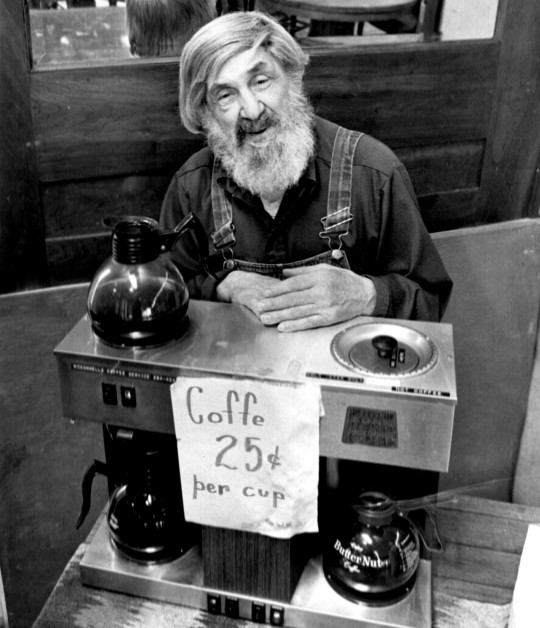
image taken from Iowa Now.
Bill Sackter was born in St. Paul, Minnesota in 1913, born to Russian Jewish immigrant parents. His father passed when he was 7 due to the Spanish flu, and the same year Sackter struggled in school. After taking a mandatory intelligence test, the state sentenced a verdict that placed him in the Faribault State School for the Feeble-Minded and Epileptic. He stayed there for 44 years.
In 1964, when new treatments were being introduced for people with disabilities, Sackter was moved to a halfway house where he worked to support himself, and made friends with filmmaker Barry Morrow and his wife. As their friendship evolved, Marrow became Sackter's guardian, and when Marrow got a job at the University of Iowa, Sackter followed him to Iowa City where he became the proprietor of Wild Bill's Coffee shop.
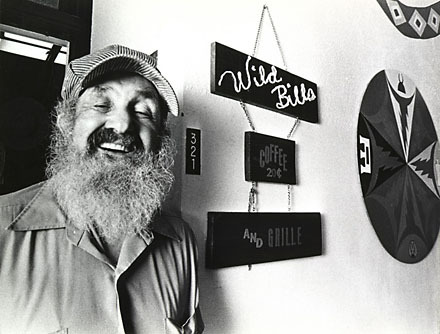
image taken from The Iowa Source
Wild Bill's Coffee Shop -- The late Tom Walz, a former director and professor in the UI School of Social work, created Wild Bill's Coffee Shop in 1975 to provide work for Sackter. Walz put him in charge of running the small coffee service located in North Hall. The coffee shop employed individuals with disabilities and served as both a job site for them and a learning lab for social work students.
In 2021, 46 years of service, the shop determined that because other coffee shops and kiosks in the area were hiring individuals with disabilities, that they would close down the coffee shop and instead make the now renamed "Wild Bill's" into a "community space, makers' space, and classroom" and that the space will still "collaborate with the disabilities community to include people with disabilities in the school’s social justice advocacy, and carry on the legacy of innovative social work faculty who came before."
Apart from the coffee shop, Bill Sackter was busy working with media groups that were interested in his life. Walz created a written biography about him, while Marrow co-wrote a movie about his life titled Bill (1981). That movie did so well it earned a sequel: Bill on His Own (1983). From the movie Bill, here at UIowa we have the Emmy and the Emmy Award video that the movie won. We also have the documentary that was made about Sackter's life titled "A Friend Indeed – The Bill Sackter Story."
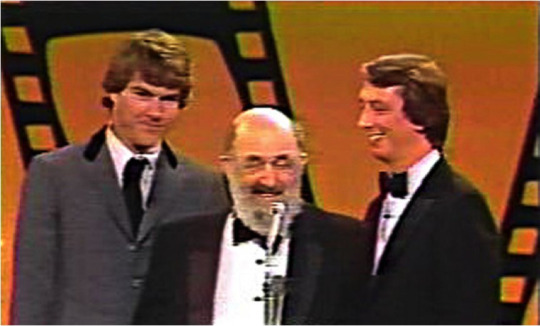
Dennis Quaid (actor), Sactker, and Morrow accepting Golden Globe from the Iowa Digital Library.
More about Bill Sackter and the history of Wild Bill's Coffee Shop can be found here and here on our Iowa Digital Library!
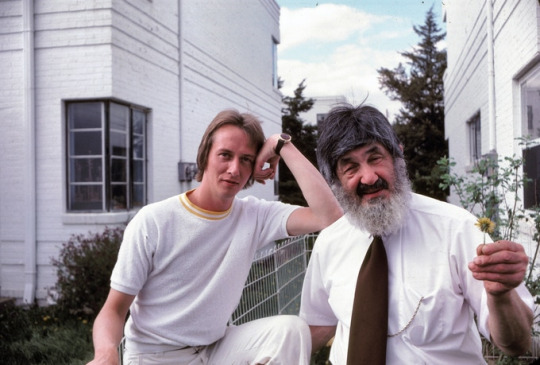
Morrow & Sacktner, image taken from Kickstarter.
We also have other collections relating to disability and disability activism, which can be found by searching here.
Did you know..
that according to the CDC, 1 in 4 adults in the US have some type of disability, 1 in 4 adults (45-64) have not had a routine check-up in the past year, 1 in 3 (18-44) adults with disabilities have an unmet healthcare need because of costs, don't have a usual health care provider, and that many individuals with disabilities are unable to get married without losing their benefits? Learn more from activists Alice Wong, Haben Girma, and the late Evelyne Jobe Villines.
At the University of Iowa, we also have services at the student level [UI Students for Disability Advocacy & Awareness (UISDAA)] and institutional level [Student Disability Services (SDS)].
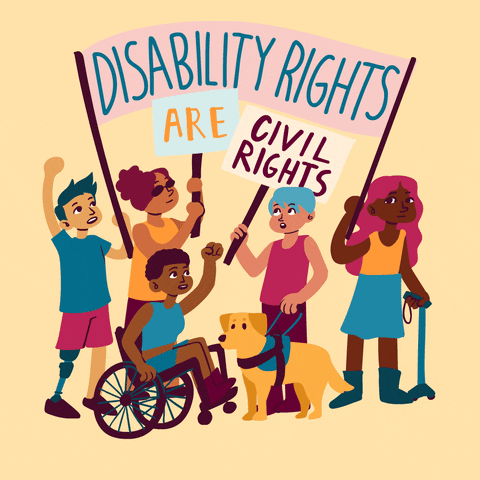
Gif taken from Giphy.
Happy Disability Pride Month!
-Matrice Y., Special Collections, Olson Graduate Assistant.
#disability pride month#special collections#uiowa#libraries#uiowaspecialcollections#voicesfromthestacks#specialcollections#university of iowa#bill sackter#wild bill's#social work
99 notes
·
View notes
Photo

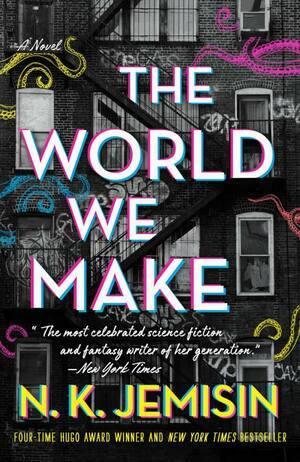

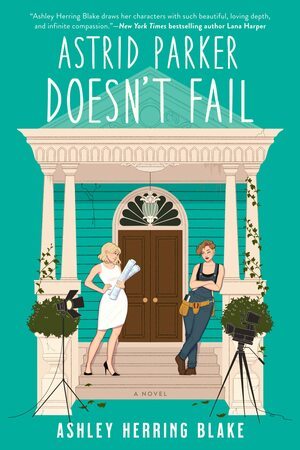
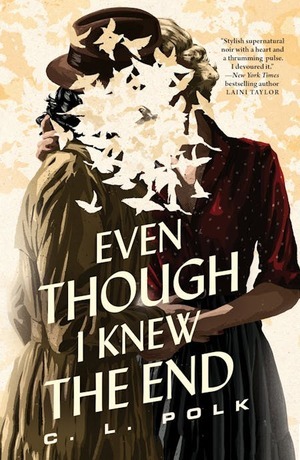


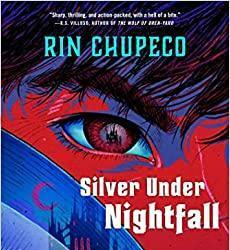
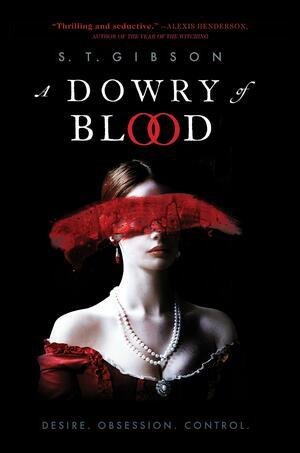

January Monthly Recap:
My new year is going well (if also very, very busily) and that also means my reading year started off well! I read 23 books, which I gave an average of 4.13/5 stars - I read so many kickass books this month! I loved Ocean’s Echo, caught back up on Saga, absolutely devoured Silver Under Nightfall, and had very surprising feelings about The Stars Undying! I also had a few duds, but isn’t that always life.
Saga, Vol. 4 by Brian K. Vaughan and Fiona Staples [hereafter referred to as BKV/FS]: 4.25/5, re-read
Saga, Vol. 5 by BKV/FS: 4.75/5, re-read
Kiss Her Once For Me by Alison Cochrun: 2/5
Ocean’s Echo by Everina Maxwell: 5/5
A Dowry of Blood by S.T. Gibson: 4.5/5
Sunshine by Robin McKinley: 5/5, re-read
One Dark Window by Rachel Gilig: 4/5
Saga, Vol. 6 by BKV/FS: 4/5, re-read
Saga, Vol. 7 by BKV/FS: 5/5, re-read
Saga, Vol. 8 by BKV/FS: 4/5, re-read
Saga, Vol. 9 by BKV/FS: 4.5/5, re-read
Saga, Vol. 10 by BKV/FS: 4.25/5
Even Though I Knew the End by C.L. Polk: 4.75/5
Baker Thief by Claudie Arseneault: 4/5
Silver Under Nightfall by Rin Chupeco: 5/5
The Girl in the Tower by Katherine Arden: 4.25/5
Haben by Haben Girma: 3/5
Astrid Parker Doesn’t Fail by Ashley Herring Blake: 4.5/5
Never Judge a Lady By Her Cover by Sarah MacLean: 4/5
The Stars Undying by Emery Robin: 5/5
The World We Make by N.K. Jemisin: 4.25/5
Royal Holiday by Jasmine Guillory: 2.75/5
Velvet Was The Night by Silvia Moreno-Garcia: 2/5, dnf
My goal tracking is under the cut, as always.
23 in 2023: 3
Read 100 books: 23
Translated works: 0
Physical TBR: 0
Top of TBR: 1
Books in Spanish: 0
Read 40% AOC: 26.1%
Discworld books: 0
Series: 3 started vs. 8 caught up on/finished
Storygraph recs: 0
Indigenous authors: 0
14 notes
·
View notes
Text
random thoughts on writing blindness
I put this as a response to someone else's post on a specific blind trope, but I realized my thoughts are more general, so:
I recommend reading memoirs by blind people. The poet Stephen Kuusisto has a great one called Planet of the Blind and one about his seeing eye dog called Have Dog, Will Travel. I also really liked John Hull's Touching the Rock: An Experience of Blindness. These memoirs focus specifically on what is it like to have a disability, and not a more specific story, such as Haben Girma's: Haben: The Deafblind Woman Who Conquered Harvard.
Research WHY your character is blind. In fiction blindness is almost always caused by injury, but in real life it's more often caused by disease.
I think injury-based blindness is appealing because it seems more simplistic to write (they can't see, done, no more to research) and because it can be a way to tell us something about their backstory (e.g. lost their sight in war, during a chemistry experiment, etc).
Actually, blindness caused by injury requires plenty of research. Starting point: Glass eyes aren't usually made from glass anymore.
But having the blindness come from a disease can be the backstory too (e.g. were they born blind or not? how did they deal with it? what experience of disease affects their present-day experiences?), and it can affect the character's actions on the page in interesting ways.
I'm thinking right now not of blindness, but of NK Jemisin's trans character in her Broken Earth trilogy, and how the character needs to acquire hormones during the apocalypse.
I have chronic uveitis, which caused temporary partial blindness in my left eye for about eight months last year. Before it was treated, I couldn't see anything except light from my left eye. During that time, I sometimes wore an eye patch due to severe photophobia, pain, and because my eye startled others.
As it healed, my vision gradually came back. For months it was like looking through very thick frosted glass. I wasn't able to read. Later, my vision was hampered by black dots. Even later, I saw disruptive halos around lights or anything white, which made it almost impossible to see when it snowed and everything was white and glowing obscurely. If I were a driver I wouldn't have been able to get behind the wheel safely during that time. The healing process was slow, and the nature of my vision impairment changed frequently.
We have this idea that blind people are 100% blind 100% of the time, but conditions like uveitis can account for up to 25% of all diagnosed blindness in some countries. Uveitis usually affects just one eye, is usually partial, and isn't typically permanent if treated quickly.
This isn't to tell you to put uveitis in your story, btw. It's to give one example of how much vaster the topic of vision impairment is than most people imagine.
Also, btw, on including more than one blind character: Lots of blind folks know each other! If you're writing contemporary, know that there are blind social clubs and associations. My grandmother was a member of her local blind club. She was very social, constantly went out, etc, and literally all of her friends were blind. (Actually she had one token seeing friend.)
Some questions to ask are: What causes the blindness? Was the character born with it or got it through disease or injury? (Congenital disability is a very different experience than becoming disabled later in life.) Which eyes are affected, and to what degree? Is the blindness a primary condition, or the effect of another disease (i.e. a systemic autoimmune disease)? Does the degree of vision impairment change (get better/worse)? Is it a progressive or chronic condition? Curable/treatable? Does it cause pain? All of these things will impact not only your character's internal experience but the story plot itself.
Understanding the nuances of blindness has the bonus of making your story more interesting. I think having a character with my condition, i.e. someone who spontaneously loses their vision but can (potentially) get it back, means that you can adjust your character's abilities based on what's needed by the plot, and vice versa.
Maybe they urgently need medical treatment with no warning; maybe that comes during an already-tense climax. Maybe they get the treatment they need, and maybe they don't, and there are consequences. This is just one example.
Allowing disability and disease to impact your story lends it not only realism but also dynamism. It makes for more creative storytelling.
#writing while disabled#writing disablity#writeblr#writing community#writing advice#writing visual impairment#writing blindness#my thoughts#disabled characters#disability representation
14 notes
·
View notes
Note
Hey Laur 💕 Just wanted to say happy disability pride month and happy 32 to the ADA! Thank you for trying to raise awareness! If you're feeling up for it, would you like to share some disabled artists or advocates that we should know more about? As a designer I'm always striving towards more accessible and inclusive works and try to continously educate myself, clients and interns/students, so I am always grateful for new perspectives! Thank you and sending so much love your way 🤟
Hi, of course! We celebrate disability pride year round! (alternatively: I'm posting this ask outside of July because I wanted to put together an intensive list)
[ Disabled Artists/Creators: ]
Christine Sun Kim (Korean-American deaf woman. she works as a sound artist and has done a Ted Talk. her art famously depicts issues between the hearing and deaf worlds)
Lachi (black blind woman. singer and advocate for accessibility and visibility in the music industry. she has a youtube series documenting her journey.)
Troy Kotsur (white deaf man. long-time actor respected by the Deaf community who finally got his mainstream recognition through CODA, now trying to break through in activism)
Youmee Lee (Korean-American deaf woman. an artist w/ many medias such as animation, clay, painting, and digital art.)
Donald Rodney (black disabled artist who passed away in 1998 from sickle cell anemia. his art heavily centered around his experience being ill, alongside other topics such as racism, inequality, and bodily autonomy.)
Sam Slupski (white, chronically ill, non-binary writer and content creator. they discuss their experience with OCD, chronic illness, their gender journey, and is otherwise a very calming lifestyle blog!)
Chuck Close (white disabled artist with dyslexia, prosopagnosia, and paralysis. his work focused on abstract photorealist portraits of people.)
MANY MORE: Raul Pizarro (visual artist w/ muscular dystrophy), Mari Katayama (multimedia artist and amputee), Phelan Conheady (deaf content creator), Christy Brown (artist and writer w/ cerebral palsy), Riva Lehrer (painter and writer w/ spina bifida), Meeya Tjiang (deaf digital artist and designer), Keith Salmon (blind landscape artist), Nabil Shaban (actor and activist w/ ostogenesis imperfecta), Frida Kahlo (painter w/ chronic pain and spinal injury). Even more here!
[ Disabled Activists: ]
Judith Heumann (white Jewish disabled woman. wheelchair user. activist, author. if you know disability history, she's been around since the civil rights movement.)
Ebony R. Gooden (black deaf woman. frequently discusses her intersectional experience and boosts other black creators.)
Sarah A. Young Bear-Brown (Meskwaki deaf woman. advocate for deaf indigenous rights. link is to her twitter. she also frequently creates facebook vlogs and has a shop.)
Alice Wong (AAPI disabled woman. wheelchair user. activist, public speaker, author. founder of the Disability Visibility project.)
Quinns_quirks on twitter (AAPI non-binary neurodivergent deaf adoptee. shares their experiences about being a transracial adoptee and its impact on their life, as well as other topics.)
Sukhjeen Kaur (chronically ill activist in South India, founder of a startup called Chronically Brown.)
MANY MORE: Chella Man (deaf creator), Madison Russell (queer wheelchair user), Riah Person (autistic advocate), Victor Pineda (activist and consultant w/ muscular dystrophy), Jules Dameron (deaf queer filmmaker), Javed Abidi (activist for disabled employment), Aaron Rose Philip (disabled model), Haben Girma (deafblind lawyer and author), Molly Burke (blind content creator), Liam O'Dell (deaf journalist)
Final Note: If you consume any of these creators' works and find them enlightening, consider monetarily supporting them if they have direct links!
#disability#disabled community#ref#anon i hope you're still around! sorry for the wait!!#i'm not putting this under a read-more because it needs to be read#i put so much work in this#disclaimer - this list isnt all encompassing there's probably a ton more wonderful creators i couldnt find#also i recognize the prevalence of white people in these spaces - possibly due to visibility & accessibility to resources#(moreso on twitter)#while there's some growth in new creators/advocates i feel like there's still so much to do!
29 notes
·
View notes
Text
disabled people deserve to see themselves in history. disabled people deserve to know about disabled activists and the disability rights and disability justice movements. disabled history should be taught in school.
representation is not just about race and sexuality. when we talk about historical revisionism we should stretch further than just the 1619 project because what we're missing in our history classes is not just Black stories, and especially not just the stories of Black abled men.
tell intersectional histories. let's talk about Jewish disabled activist Judy Heumann. Let's talk about Black Deafblind lawyer Haben Girma. Let's reach past MLK Jr. just a little bit, please?
Signed, a tired history major
#history major#disabled history#this post is throwing a molotov cocktail at a gasoline factory but whatver
11 notes
·
View notes
Text
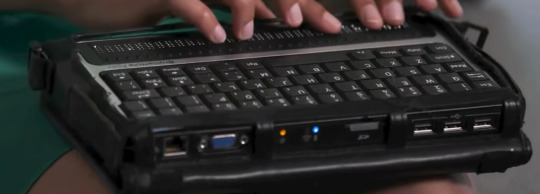
hold up i was watching a video about helen keller and deafblind people in general (its really early in so im not gonna quite link it yet) and i found this absolutely fuckin awesome computer / alphasmart word processor thing that haben girma, a deafblind human rights lawyer, uses to write. i hate how assistive technology goes so often unexplored, i want a techmoan style video of someone giving a tour of this device because i think showing this sort of stuff to more people gets able bodied people thinking about how they can make things more accessible in small ways
3 notes
·
View notes
Text
2 notes
·
View notes
Note
🎒 and 📖 :))
hi sammy <3
🎒 Are you in college, major area of study
no more college for me ever again!!! i double majored in history and international politics in undergrad, then got my master's in political science this spring :)
📖 Fave book
answered, but i'll also say some of my favorite nonfiction books i've read so far this year were the girls who went away by ann fessler, jesus and john wayne by kristin kobes du mez, and haben by haben girma!
2 notes
·
View notes
Text
Haben Girma, the 1st Deaf & Blind Afrikan Woman Harvard Law School Graduate
www.instagram.com/p/CpvlCJ5J3sr/
View On WordPress
#1st deaf& blind Harvard Law School graduate#African/Black experience#Afrikan#disability rights attorney#Haben Girma#inspirational#leader#revolutionary#revolutionary leaders
0 notes
Text
OMG I think I just saw Haben Girma in the train station !!
Disability celebrity sighting!
0 notes
Text
0 notes
Text
Optimistic Haben Girma Bio, Age, Height, Weight, Career, Husband, Net Worth2023
Share and like the post.
Presidential Remarks on the 25th Anniversary of the Americans with Disabilities Act (C-SPAN)
Hello friends, have you heard the name Haben Girma? She is an American deaf-blind attorney, author, and champion for disability rights. She refers to herself as being “deaf-blind”. The first deaf-blind graduate of a legal program in the United States was Girma. She was honored as a 2013 White House…

View On WordPress
0 notes